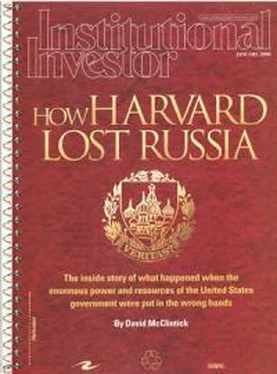He said that it would be "a good idea for Andrei to make sure he was operating within the rules of whatever legal arrangements he had with Harvard" and that Shleifer should check what his personal contract said. Zimmerman, Summers said, "should just think hard" about what she was doing.
When Zimmerman later consulted with her husband about Summers' advice, Shleifer said, "We can use Michael Butler if we're concerned about specific things."
ZIMMERMAN WAS NOT TO BE DETERRED. FROM Truro, on Thursday, August 29, amid the friendly chats with Summers, she agreed in an e-mail to loan Zagachin $200,000 and to sink an additional $200,000 into an equity investment so that Zagachin could get control of FRSD. But arrangements couldn't be concluded by the deadline -- September 2, Labor Day -- only four days away.
Desperate to avoid missing her big opportunity, Hebert telephoned Hay's father in Idaho and confided her anguish.
"Keffer has created a panic -- he's blackmailing us," she said. "You could help me come up with some bridge financing for Julia. It would be very short term, until we can find someone to make a long-term investment in the project. I'll make sure that it's 100 percent secure."
Dr. Hay immediately withdrew $200,000 of his own funds and $200,000 of Jonathan's and wired the money to Zagachin's bank account in Delaware the same day. Zagachin was the new owner of FRSD.
That evening Hebert and Hay reflected that Dr. Hay's generosity and quick action might have saved the Russian mutual fund industry and his son's career, and kept Vasiliev in office.
The younger Hay e-mailed Zimmerman in Truro: "Everything sounds fine. Call me on the mobile or at Beth's."
While Pallada was setting up shop, other financial institutions were struggling with the Russian bureaucracy. On September 13, 1996, Credit Suisse First Boston submitted an application to the RSEC for authorization to start a depository, requisite for a mutual fund company. The RSEC employees who opened the application found two small travel alarm clocks. The clocks were inexpensive tokens akin to ballpoint pens or key chains. But Vasiliev summoned CSFB's Moscow representative, Bruce Lawrence, a respected back-office specialist, accused him of criminal conduct and returned the clocks. Vasiliev sent a strongly worded letter to the CEO of Credit Suisse in Zurich. He then called in Hay and Butler and suggested that the episode be reported to the Moscow police fraud squad. Though no call was made, Credit Suisse's application was stalled, and word made its way to Washington. "I was aware," said Summers years later, "that there were concerns of impropriety surrounding Credit Suisse . . . "
Separately, Butler counseled Hay to inform Vasiliev of his relationship with Hebert, which he did later in a formal letter. Butler also advised Hay to "work out some arrangement that you won't be involved with matters that affect her company."
A few days later Hay told Butler, "I've worked it out with Vasiliev."
He hadn't.
Butler also demanded that Hay impose order on the disorderly Institute for Law-Based Economy. Not for the first time, Butler took Hay to task for paying employees in cash and for "the out-of-control use of drivers for personal purposes." In a stern memo he wrote: "This system does not have to be perfect, or even very good. But it does need to be good enough to get USAID's approval."
What Butler didn't know was that Hay's headquarters in Moscow had become a virtual branch office of Zimmerman's firm, as evidenced by e-mails cited by the U.S. in its lawsuit. On September 23, for example, Zimmerman e-mailed Hay from Cambridge to say: "zagachin loan ready to go" and "we will make u a 400k loan -- u will pay back 200k asap, and the balance when it is appropriate."
Zimmerman was indicating that she might be ready, either through her firm or personally, to take Hay and his father out of the emergency $400,000 loan they had made to Zagachin at the end of August. But she continued to waver.
In other communications Zimmerman asked Hay to execute certain investment actions.
"please buy some oct 23 gkos and we will take care of everything when the current ones roll off," she e-mailed on October 10.
Less than two hours later: "did u get my last message?"
Less than two hours after that: "Did u do anything in GKO?"
It took Hay another five hours to reply that he had bought the October 23 bonds.
THE ACTIVITIES OF THE HARVARD PROJect were causing alarm among other Americans in Moscow. Holly Nielsen, deputy director of the Resource Secretariat, began to worry about a possible scandal that could embarrass Harvard and the U.S. government. In late October she met with Vasiliev to discuss the awarding of the first mutual fund registration to Hay's girlfriend rather than to a proven global securities firm like CSFB or Pioneer, Nielsen said in her deposition. Vasiliev's aide Andrea Rutherford translated.
"What would your superiors and the Russian government think of these conflicts?" Nielsen asked, according to her deposition.
"My superiors wouldn't care." Vasiliev seemed perplexed.
"People within the industry have certainly voiced concern," Nielsen replied. "It's becoming an increasingly difficult issue to try to defend."
Nielsen decided to confront Shleifer. Because she hardly knew him, she asked Rutherford to introduce her to someone who did, Joseph Blasi, a professor at the Rutgers School of Management and Labor Relations who was working for HIID, advising on employee ownership of businesses, a key aspect of privatization. Nielsen took Blasi to breakfast at the Aerostar Hotel off of Garden Ring Road on Sunday, November 3, just hours before he was to fly to New York.
Talking fast, she poured out the story of the mutual fund registration while Blasi scribbled notes on a napkin. She asked him to arrange for her to see Shleifer in Cambridge. She also asked that the communication be kept confidential: Blasi should use a code when referring to the meeting in a fax or e-mail: "The appointment with your pediatrician is confirmed."
The morning after Blasi arrived in the U.S., he called Shleifer.
"If what Holly Nielsen told me is true," Blasi declared, "Jonathan Hay should be fired immediately." Shleifer agreed to see Nielsen, although they would not meet for more than a month.
Vasiliev and Rutherford flew to New York in mid-November to represent the RSEC at the listing of mobile phone operator VimpelCom Corp. on the New York Stock Exchange, the first Big Board listing of a Russian company. They took the occasion to call on exchange attorney Richard Bernard, who warned them that, based on what he had heard since leaving Moscow, Shleifer and Hay as well as Sokin would eventually bring public embarrassment to Vasiliev.
"Your reputation has already been damaged by the mutual fund talk," Bernard said. "The reputation you have with the SEC and with people here at the exchange is being damaged."
Vasiliev listened but didn't say much. In the town car headed uptown, he asked Rutherford's opinion. She told him she agreed with Bernard.
"I essentially agree with Rich," she said, speaking in Russian. "You've been very successful in building a reputation in the West, not just for competence but honesty, and my impression is that reputation is being damaged by the talk, the rumors, the gossip about how you've treated Pallada, how you've treated Pioneer, how you've treated Credit Suisse."
"We've had too much scandal. Too many people have lost too much money," Vasiliev replied. "The reason we're handling Pallada as we are is that it is very important that there are no scandals or problems connected with the first mutual funds in Russia. The only way we can do that is to ensure tight control over these first new funds -- with somebody we know well, somebody close to us we can trust running Pallada."
Читать дальше






![Джонатан Димблби - Barbarossa - How Hitler Lost the War [calibre]](/books/385421/dzhonatan-dimblbi-barbarossa-how-hitler-lost-the-w-thumb.webp)





